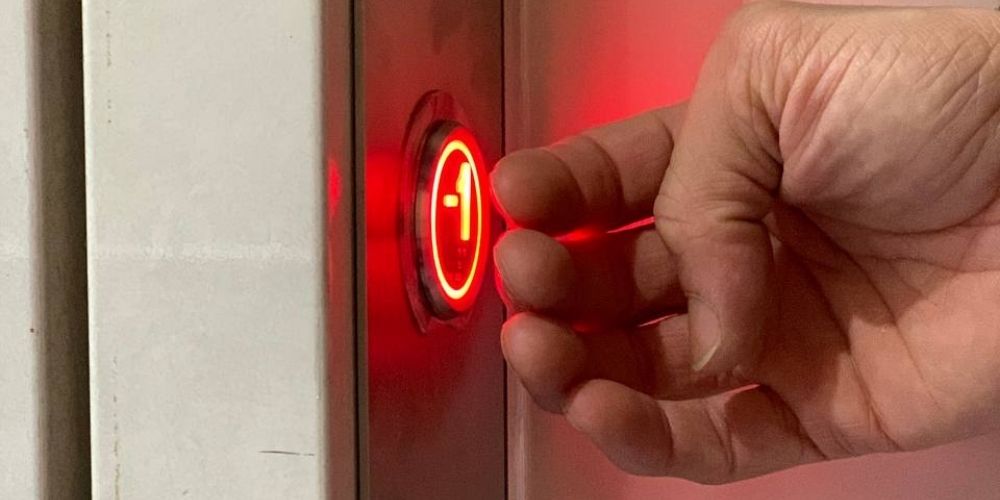
The elevator button is one of those things in public and semi-public spaces that people touch frequently. It is a hotbed of bacteria and viruses. With the current pandemic, nobody wants to touch this kind of button anymore. It stands to reason that ‘fear of bacteria’ is set to become a permanent pathology in society.
This is the reason why the Italian company Ribes Tech started developing an ultra-thin solar panel a year ago. This film that is applied to the elevator button enables it to be operated without the need for contact The elevator user just has to move their hand close to the button, which activates a sensor. “The electronic circuit board behind the button is replaced and a matching photocell film is placed over the button,” Antonio Iacchetti explains. He is the director of Ribes Tech.

Replacing the circuit board behind the button is easy, as it is compatible with all conceivable elevator push buttons. The photovoltaic foil is custom made since there is a wide variation in elevator push buttons. Nevertheless, Ribes is trying to achieve some degree of standardization. Which is why it is currently working with two elevator manufacturers, one from China and another from Italy. This should eventually lead to the standardization of its products. The patent application for the contactless elevator button is pending and the product is being sold under the name Daphne.
Virus outbreaks
Iacchetti is convinced that there is a market for this even when the corona pandemic is over in the near future. He mentions a cruise line that recently contacted Ribes and expressed interest in the touchless buttons. Not so much because of corona, but because of virus outbreaks in general. Cruise ships are typically places where lots of people gather together. On board, the norovirus (a.k.a. “the virus of the cruisers”) still occasionally breaks out, or some other intestinal disease. Touching operational buttons on board may be the cause of this. Contactless operation can be helpful in preventing the spread.
In effect, Ribes Tech is actually breaking new ground with the Daphne button. The company was founded as a spin-off of the Center for Nanoscience and Technology in Milan (part of the IIT) in 2016. Their invention is a rare ultra-thin solar panel. This can be custom fitted to small areas. The company’s name (which translated, means “berries“) is a nod to such well-known technology companies as Apple and Black Berry.
On synthetic polymer films
Thin solar panels, which are extremely flexible and easily adjustable in shape, are not a novelty. Take, for instance, solar cars where thin, flexible solar panels are mounted to the body. Most manufacturers of the latest generation of solar panels focus on large surfaces, e.g. windows and building facades. “We make photovoltaic films on synthetic polymer films that can be used for a countless number of applications. They can be transparent or colored and easily integrated into existing objects,” says Iacchetti, who holds a PhD from the Polytechnic University of Milan.
Harvesting energy
Applications include cell phones and all the other “internet of things,” but also bags, clothing, curtains, you name it. A film like this on a cell phone can have the function of a charger. Or rather, the photocells take care of ‘harvesting’ energy to power small, wireless electronics. “In principle, any surface of any size can become a photovoltaic panel. And any device, especially if it is portable, can be powered directly by light,” says the 37-year-old electrical engineer. The source is electric light in case you are indoors or when it is dark. Outdoors and during the day, (diffuse) sunlight is the source.
Industrial conversion
The fact that the solar panel film is made of plastic and does not contain any metal is an added advantage when it comes to recycling at the end of the product’s life cycle, according to Iacchetti.
For such a start-up as Ribes to have taken an important (internal) share of the flexible “solar film” market within a relatively short period of time is also thanks to OMET, an Italian company that produces specialized printer machines. This multinational has 75 percent of the shares in Ribes. As it turns out, it was OMET that knocked on the door of the Italian Institute of Technology (IIT) ten years ago to inquire about the possibilities of printing solar panel film. In any event, the success of Ribes is a good example of an industrial conversion of a technological idea.
Read more about the polycarbonate solar roof for cars here.
IIT
This is an instalment from the series featuring start-ups originating from the Istituto Italiano di Tecnologia (Italian Institute of Technology, IIT). The IIT is particularly strong in robotics, nanotechnology and computer science. You can read more about this rather young institute in the interview with the scientific director Alessandro Volta.
Previous instalment: M.I. is the engine of the soft robotic hand






